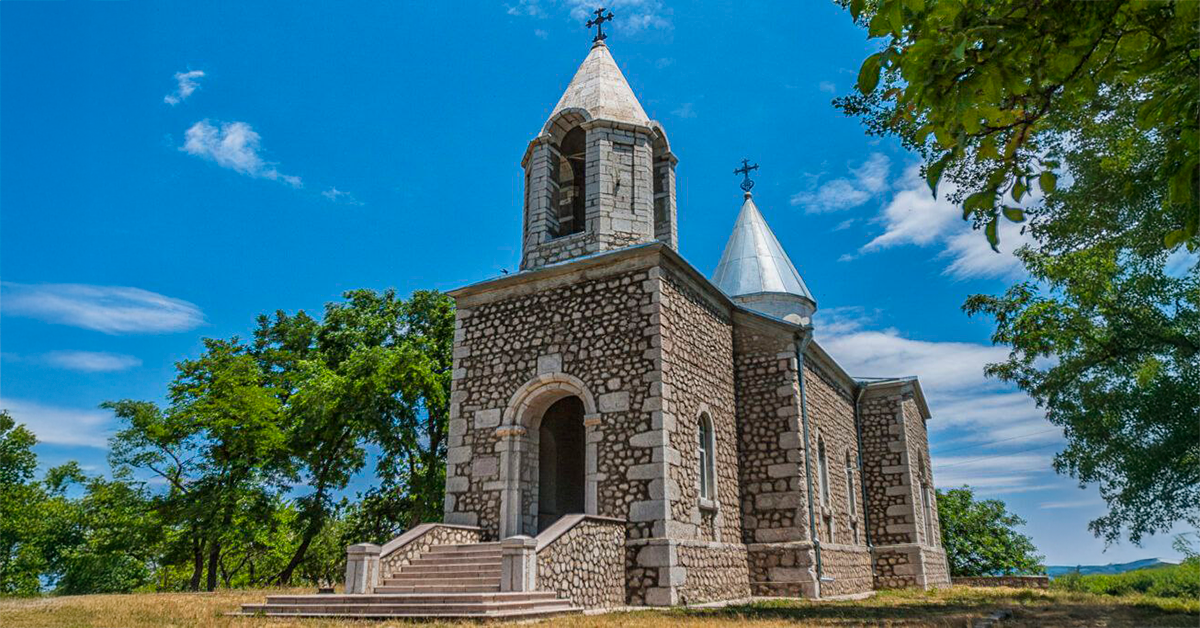“GEGHARD”
SCIENTIFIC ANALYTICAL
FOUNDATION
2026
2026
2025-05-06

Patriarch Kirill of Moscow and All Russia has presented First Vice-President of the Azerbaijan Mehriban Aliyeva the Order of the Holy Princess Olga of First Degree for “the preservation of traditional values and the promotion of intercultural and interfaith dialogue.”
Azerbaijan has two main approaches toward the Armenian-Christian religious heritage in Artsakh:
a) What has been built since the 1990s is considered "occupational" and subject to destruction.
b) What was built before the 1990s is either destroyed or declared to be Caucasian Albanian.
However, there is one notable exception—the Saint John the Baptist Church of Shushi, more commonly known as Kanach Zham (the Green Chapel). Azerbaijani propaganda had declared it a Russian Orthodox church that was “Armenianized” later. In any case, whether Russian Orthodox or not, it no longer exists, as Azerbaijan has razed it to the ground.
What is its reaction to the destruction of Kanach Zham by Russian Orthodox Church, which awarded the high-ranking Azerbaijani official for promoting interfaith dialogue, and whose diocese head in Azerbaijan visited Shushi and regularly made anti-Armenian statements alongside leaders of other registered religious organizations in Azerbaijan?
If it does not recognize the church as Russian Orthodox, has it urged Azerbaijan to refrain from falsification?
If it does recognize it as a Russian church, has it demanded clarification on why it was destroyed?
Almost every city and village in Artsakh had monuments or memorial complexes dedicated to the Great Patriotic War. In just a few days, Moscow will hold a parade marking the 80th anniversary of that victory—a triumph to which the Armenians of Artsakh made a significant contribution. Yet over the past 4–5 years, Azerbaijan has been systematically destroying these memorials as well.
Has the Russian Orthodox Church ever shown concern or protested the destruction of memorials dedicated to those who were martyred for what was once a common homeland? Or is it possible that it has simply “forgotten”—out of political expediency?
Azerbaijani propaganda claims that the entire Christian cultural heritage of the region is Caucasian Albanian. By exploiting the ancient history of the Caucasian Albanian people, as well as the small size and vulnerable condition of the Udi community, Azerbaijan seeks to instrumentalize the so-called “Albanian-Udi community” in order to appropriate Armenian cultural heritage. To that end, Baku is seeking recognition for the Albanian-Udi Church within the Christian world.
Any institution that supports this policy must clearly understand that it is aiding a campaign built on the erasure of the legacy left by one of the world’s ancient Christian civilizations, and thus bears responsibility for its destruction.
It should be mentioned that the Russian Orthodox Church, whether directly or indirectly, is encouraging the current Azerbaijani authorities—those who are actively destroying the Christian heritage of the region, demolishing Russian cemeteries, and tearing down monuments to participants of the Great Patriotic War.